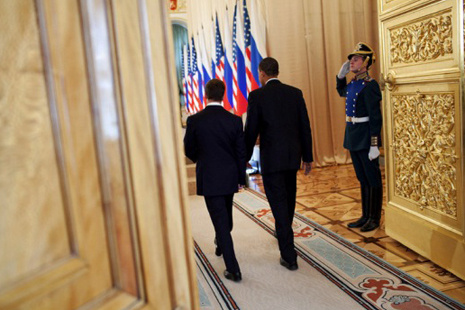Russia Seeking a New Role

By: Hassan Beheshtipour
After a period of uneasy relationship between Tehran and Moscow, last week’s visit by Nikolai Patrushev –Russia’s National Security Council Chairman- to Tehran, and Iranian Foreign Minister Ali-Akbar Salehi’s visit to Moscow indicate a thaw. Patrushev, highly regarded by Putin and Medvedev and enjoying a significant stature in Russia's political structure, visited Tehran to discuss the “step-by-step” proposal with Iranian officials (Middle East and North Africa developments were also on the plate.) Russia is cognizant of the fact that approaching Iran –an influential player in regional developments- will give it a more powerful lever in calibrating its relations with the US. Furthermore, by embarking on an independent Iran approach, Moscow will assure other regional states about the benefits of strong bilateral ties. Categorical support for Washington’s Middle East policies is not something that would build trust between Moscow and countries of the region.
With the step-by-step proposal, Moscow has demonstrated its intention to switch roles from a bystander –or moderator- into a proactive player in Iran's nuclear program. Several features of the proposal encourage us to be optimistic:
1. The step-by-step plan is conscious of the root cause of the failure of previous negotiations. During the past 8 years, the six global powers (five permanent members of the UN Security Council plus Germany, the P5+1) have pressed Iran to make significant concessions while they have been surprisingly frugal in offering incentives. Even if presented, the incentives were never binding on them.
2. The plan dispenses with the carrot and stick policy, and draws on a new cooperative framework. With every set of questions that Iran clarifies, Moscow suggests providing it with incentives. Though still a sketch, the proposal’s mechanism creates an opportunity for rebuilding mutual trust.
3. Phasing in the divisive questions in later stages bespeaks of Russia's correct perception that small fruitful steps are needed to lay the groundwork for further agreements. Easy questions are the best route toward a final deal.
4. During the last eight years, Russia has at best played the role of a buffer for Iran's nuclear program; a moderator of sanctions against Iran via diplomatic negotiations, especially in the domain that affected its trade ties with Tehran. Despite their initial opposition, at the end of the day the Russians always preferred conditional support for the United States’ measures against Iran to confrontation, hence even refraining to cast a vote of abstention for anti-Iran sanctions. The step-by-step plan shows that Russian politicians have decided to switch to a new plane in international diplomacy, especially as the presidential election is approaching. Patrushev’s visit to Tehran can be a turning point in Tehran-Moscow relations.
Nonetheless, the proposal will turn into another failure if a set of fundamental conditions are not met:
- Both Tehran and Washington should show seriousness about the negotiations;
- Both parties should consider each other’s red lines. For Iran that is uranium enrichment; for the US it is Iran's shift towards weaponization of its nuclear program. At this stage, building mutual trust is the key objective.
- There should be a limit to the questions, especially when one remembers the “modality plan” worked out between Iran and IAEA during the time of ElBaradei. The plan consisted of six basic questions for all of which Iran was supposed to give clarifications and in return have its nuclear dossier returned to a normal status. Nevertheless, Iran's answers were deemed incomplete by the IAEA. Moreover, even as Iran provided answers for the six ambiguous points, Washington posed another set of questions accusing Iran of following a secret nuclear weapon program, without providing credible evidence. The claims were exactly reflected under the label of “alleged studies” in Mohammad ElBaradei’s reports. Demarcation is an imperative if neither of the parties wants the negotiations to stretch on forever.
- The ultimate goal of the plan should be clarified. What is supposed to happen if Iran removes all ambiguities? Will its dossier return from the UN Security Council to the IAEA? Or it will stay in the UNSC under Chapter 7 of the UN Charter-- ‘Action with Respect to Threats to the Peace’?
The step-by-step plan implies Russia's departure from the United States in regards Iran's nuclear case, in order to gain credit as a reliable mediator. In the meantime the carrot and stick approach has proven its futility. Iran has not caved in to pressures and intimidations throughout these years and increasing pressures on the charges of being a threat to international security have merely backfired, adding up to Iran's drive for scientific advances and technological self-reliance. Ending the nuclear dispute over Iran's program will also give Russia an opportunity to upgrade its regional and international profile.
Hassan Beheshtipour is Russian affairs analyst and member of the policy board of the Iran's state-run English TV network Press TV.

